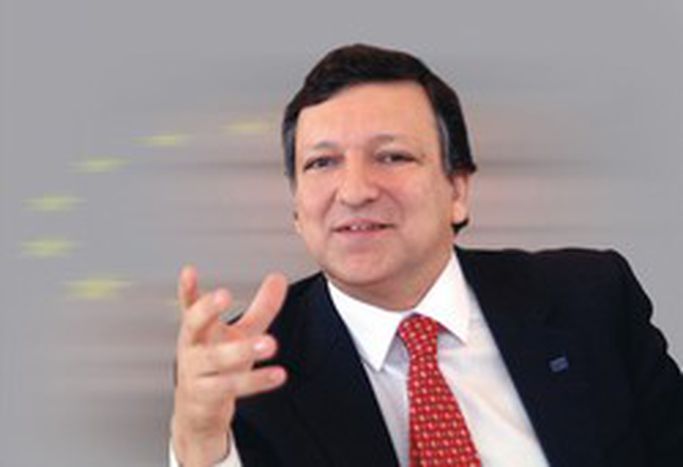
Barroso: The dream candidate?
Published on
Translation by:
 dominic harrison
dominic harrison
There was unanimous approval from EU heads of state when Barroso unveiled his new Commission. Will they live to regret the compromises they made?
 When, after weeks of tortuous negociations, EU prime ministers and heads of state assembled on the eve of June 29 2004 and finally agreed on Romano Prodi’s successor, the event went largely unnoticed. This is hardly surprising since the new President of the European Commission, ex-Portugese Prime Minister José Manuel Durão Barroso, has not exactly been a key player in European affairs. Even in Brussels, if you’d mentioned his name a few months ago you’d have drawn a blank. So who is this man who, as of November 1st, is set to play such a key role in EU politics?
When, after weeks of tortuous negociations, EU prime ministers and heads of state assembled on the eve of June 29 2004 and finally agreed on Romano Prodi’s successor, the event went largely unnoticed. This is hardly surprising since the new President of the European Commission, ex-Portugese Prime Minister José Manuel Durão Barroso, has not exactly been a key player in European affairs. Even in Brussels, if you’d mentioned his name a few months ago you’d have drawn a blank. So who is this man who, as of November 1st, is set to play such a key role in EU politics?
Political Chameleon
Barroso, 48, began his career in academia. He studied law in Lisbon, and was an exchange student in Geneva, Washington, New York and Luxemburg. He made a name for himself abroad as a visiting professor and journalist specialising in European politics.
Barroso's political career began during the 1974 Carnation revolution, which put an end to the military dictatorship which Portugal had endured since 1926. The law student was a member of the Maoist Reorganising Movement of the Proletarian Party (MRPP). It wasn’t long before he changed his allegiances however, and in 1980 he joined the Social Democratic Party (the PSD). Although its name suggests otherwise, the party is actually significantly right of centre.
Critics might query the political integrity of the designated President of the European Commission in the light of this sudden conversion to conservatism. However, Barroso has a quick ripost ready: “If you’re not a communist when you’re young, you have no heart, but if you are still a communist when you grow up, then you have no reason.” (Corriere della Sera, June 30 2004). Barroso has to rely on the goodwill of various factions, and as such presents himself as a moderate: “I am a reformer, not a revolutionary, a politician of the centre, not a free market fundamentalist.”
Barroso climbed his way up the political ladder in next to no time. Anibal Cavaco Silva, leader of the PSD and “father“ of the modern Portuguese right, was a great mentor. In Barroso he recognised a rising star and in 1987 he appointed him as State Secretary in the Ministry of the Interior. In the years that followed, Barroso was also able to test his diplomatic skills on the international stage: successful mediation in Angola in the early 1990s between the government and rebels was one of his major achievements.
His path to the top continued with his promotion to Foreign Minister in 1992, party leader in 1999 and Prime Minister in April 2002. He had scarcely entered office before introducing drastic spending cuts in an effort to reduce the budget defecit and stem criticism from Brussels. Criticism at home, however, was not in short supply. Even members from his own party voiced their concerns: “I’m worried about social cohesion“ Santana Lopes, Barroso’s longtime friend and political rival, told the French daily L’Express.
Given the problems Barroso was facing back home, the nomination to President of the European Commission was surely timely. But he was soon to discover that it wouldn’t be an easy ride in Brussels either.
Divided sympathies
Barroso faces particularly vehement opposition from Europe’s Social Democrat camp. For them, Barroso is synonymous with social breakdown and neo-liberal politics. Others fear that the Commission will shift to the right under his leadership. This concern, which José Arantes(Barrosos’s political adviser) tried to dismiss by claiming that Barroso is still closer to the left than Tony Blair, has not been allayed. And then there is Barroso’s relationship with the US and his stance on the Iraq war. For many critics his transatlantic outlook – he signed the “Gang of Eight“ Iraq Letter, and aligned himself with the Azores Summit in March 2003 – begs the question of his suitabilitly for the highest position in the European Commission. Barroso is nevertheless regarded as an ardent European. Is that enough to smooth over the difficulties in Europe’s relations with the US?
A full agenda
When the new President of the European Commission moves into the Berlaymont building in Brussels (the seat of the European Commission), there will be a whole array of tricky tasks waiting for him. The post-2007 budget will need planning, further discussions on membership to the EU are imminent, and as well as all that, the Commission will need to prove itself as the defender of European interests.
Sceptics fear that Barroso lacks the necessary resolve and experience at a European level to make sure that happens. To date, Barroso has proven them wrong. Barroso did not pander to national governments in selecting the members of his Commission. We can only hope that he continues to stand firm and that, in time, he turns out to be the “dream candidate“ after all.
Translated from Barroso: Dritte Wahl für Europa?


